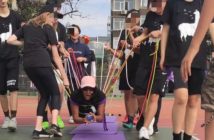For our column, Ask an Educator, we turn to educators, whether teachers, tutors, or principals, to answer frequently asked questions from parents. To send in your question, email jessicasuotmaa@beijing-kids.com.
This week, our question is:
“What are critical thinking skills, and why are they important?”
Answering for us is Johnathan Lin, Managing Director at Mr. English International Language Institute.

Critical thinking means to not just blindly read or hear something and believe it; it means you test information by asking whether it is true or not. This can be applied to every area of life from schooling to the workplace and even in the relationships with family and friends. It enriches your life by bringing substance through seeking the truth and finding out reasons behind how things work.
Teaching critical thinking skills is really about teaching your child to fish rather than just giving fish to them. When schools provide students with a curriculum to memorize, they serve their short-term purpose by allowing students to pass tests and graduate to a higher level of education. However, when critical thinking skills are encouraged, children are given the necessary tools to find key information for themselves through skills of evaluation and analysis–ultimately allowing that curriculum to be used to solve problems at hand. Parents are their children’s first school system, which makes it fundamentally important for parents to pave the road ahead by fostering the concept of critical thinking in their children early on, and by selecting institutions and facilities that are in-line with this idea to ensure your child grows up better equipped and prepared for life.
We are all born as different shapes: some as stars, some as squares, while others as diamonds, circles, and rectangles, etc. These differences mainly resonate in our thought-processes, abilities, and inherent character and natural talents. The western education system embraces a way of learning by allowing children in their early years of education to identify what shape they are through critical thinking. Knowing who they are sets the child on a path of self-discovery through questioning, which ultimately gives them a purpose to life.
Duke Talent Identification Program recommends parents to visit their children’s classrooms and answer the following questions:
– Are students coached to question their thinking processes and those of their classmates?
– Are students afforded opportunities to evaluate their progress regularly?
– Are students encouraged to pose questions regularly in class?
– Are students provided with guides to help them reflect on their thinking (such as Bloom’s Taxonomy)?
– Do class projects engage students in analysis, synthesis, and evaluation?
– Are students given opportunities to consider various opinions and to justify their own beliefs?
As an educator in American language and culture at Mr. English Institute, I am constantly faced with disillusioned parents who have been discouraged by the education system in China. The system here has not equipped their children with the tools kids need to face real world issues after high school or college. Rote learning through memorization is a skill that is widely used to pass tests, but isn’t a form of intelligence that can transcend to real world skills and value.
Critical thinking skills can determine what pieces of information are important along with ridding information that is not useful or applicable in nature. This allows a person to weigh-in on various facts and perspectives while identifying errors in logic and reasoning, which then helps in the problem solving process. Critical thinking can bring a clearer perception that also makes a person capable of examining their own values, convictions, and opinions. With critical thinking, a person can continuously reach new heights in their life goals and grow as a person.
Photo: courtesy of Johnathan Lin




